
The prospects for a deal with the EU over post-Brexit arrangements for Northern Ireland have been raised, as Michael Gove said the government was “confident” it would not need to trigger article 16 suspending the current deal.
The cabinet minister, who has special responsibilities for the union, suggested there were sufficient signs of progress after five weeks of talks that the government would not need to follow through on its recent threats.
“Everyone recognises that the application of the protocol at the moment is causing some disruption to trade and is causing inconvenience at the very least to citizens of Northern Ireland,” Gove said at a press conference following a summit meeting of the British-Irish Council.
“I do believe that there is a constructive approach that’s being taken by the [European] Commission and Lord Frost has signalled that while, of course, it’s always possible that article 16 may require to be invoked, we’re confident that we’ll be able to make progress without it.”
It is understood Gove’s optimism is not wholly shared by those more intimately involved with the negotiations, which are widely expected to run on past Christmas. But the combative language around previous meetings between David Frost, the UK’s Brexit minister, and the European Commission vice-president Maroš Šefčovič had been dropped as the two chief negotiators talked in Brussels on Friday.
In a statement, Lord Frost said while “significant gaps” remained, there was “the potential to generate some momentum in our discussions”. “Looking forward, the United Kingdom’s preference remains to secure a solution based on consensus,” he said.
The European Commission, in a post-meeting statement, reiterated a call for a reciprocal “move” by Boris Johnson’s government following the EU’s proposal in October to cut out most checks on goods coming from Britain. The commission added that it was “essential that the recent change in tone now leads to joint tangible solutions in the framework of the protocol”.
But the EU did not double down on the claim made just a fortnight ago that the UK was failing to engage sincerely in the talks nor did Šefčovič raise publicly the prospect of retaliatory moves should article 16 be triggered.
Both sides reported that there had been good progress in ensuring medicines authorised in Britain would be freely available in Northern Ireland, although there was some frustration on the EU side that agreement on that issue had not yet been found. “We now need to press on and get this crucial issue across the line,” the commission said.
Frost had earlier told reporters that he had been heartened by comments on Thursday night from the Irish taoiseach, Micheál Martin. “Where there is a will, there is a way, and I think both sides just need to knuckle down and get it resolved,” Martin said in an interview with the BBC.
Asked whether there was any prospect of a compromise solution on the UK’s demand that the European court of justice lose its role as arbiter of disputes over EU law in Northern Ireland, Frost was conciliatory.
He said: “It’s not an issue that we have managed to discuss very much so far. We have very different positions. But I know the taoiseach said last night that the EU had serious intent to resolve the difficulties that we’re facing, and I think that’s very good thing that we take that very seriously.”
Meanwhile, the French president, Emmanuel Macron, criticised the commission for failing to defend the interests of its fishers operating in UK coastal waters, while his maritime minister said Paris would “fight” for their rights.
Macron, who faces an election in April, told reporters during a visit to northern France that the UK should be forced to fulfil its treaty obligations. He said: “We did not get what we wanted. They are playing with our nerves.”
The French government claims it is due a further 150 licences for vessels operating in the waters of the UK and Jersey, a British crown dependency. “We will continue to fight every day to get what should be ours and so that those 150 licences arrive,” the French maritime minister, Annick Girardin, told France Inter radio.
The Northern Ireland protocol in the withdrawal agreement that Johnson signed keeps the region in the single market and draws a customs border down the Irish Sea in order to avoid a hard border on the island of Ireland. In October, the EU offered to drastically reduce the number of checks on goods coming from Great Britain to Northern Ireland in recognition of the political and economic disruption being caused.
On Friday, Šefčovič said: “These measures would create a type of ‘express lane’ which would substantially facilitate trade between all parties. A win-win situation for all. It is a unique and completely new model for how goods can be moved from Great Britain to Northern Ireland, one that would strengthen opportunities for people and businesses alike.”
Frost and Šefčovič will meet again next Friday.











